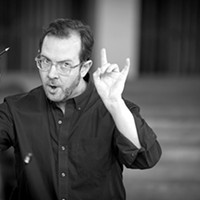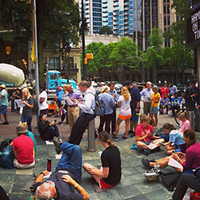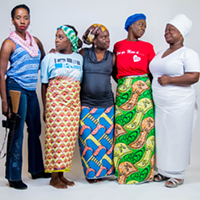It all seemed so familiar. At Actor's Theatre last Saturday night, Martha Connerton/Kinetic Works presented a choreography that was hauntingly familiar as part of their Get Passion!! show, their first at 650 E. Stonewall. As one dancer, dressed in warm-up gear, took up a ready position at center stage, another stood off near a wing with a stopwatch. When the dancer with the stopwatch called out "Go!" the other launched into a goofball routine that mixed aerobics and dance with a slovenly spice.
Suddenly, in mid exercise/dance/graceless galumph, we heard "Stop!" and the performer would take the stopwatch, the previous timekeeper would disappear, and a new performer would move into the starting position. As 54321 continued its development, there might be two dancers in this pointless exercise, three, four, or in the finale, all five with the stopwatch discarded forever. So was this a parody on some real dance studio drill that I'd seen in some other form at Innovative Works or at some other showcase of new choreography?
Nope, Connerton informed me, it was the same dance I'd seen nearly two years ago at the Dowd YMCA on Morehead -- with different dancers and the addition of music by America's Polka King, Frankie Yankovic. Aha. The music makes all the difference.
Without the polkas, the panting pointlessness of 54321 stood out as the quintet of dancers knocked themselves out. Now, with such classics as "Roll Out the Barrel" and "No Beer Today" restored ñ along with woozy references to such blue-collar towns as Pittsburgh, Milwaukee, and Cleveland -- the glorious goofiness of 54321 becomes manifest. In a multitude of ways, none of them even slightly elegant, these dancers are poking fun at the polka genre. The gray tank tops add a pinch of Stanley Kowalski "Stella!" dimwittedness to the spectacle. About the only thing missing was a lightbulb.
Connerton has definitely fortified the troupe. Two new African-American members, Erin Whitney and Mitchell, underscored just how uncool the polka truly is. Also channeling their inner Poles were Cristina Catalani, Lauren Pegram, and Starla Wood. The same quintet reappeared moments later in the evening's finale, Adrift, after a long mysterious solo by Alyce Cristina Vallejo Moran. Spurred by the moody music of Paul Dresher Ensemble and Les Voix Bulgares, Moran had this sensuous bondage thing going on with a folding chair. A radical shift from the realm of lunchpail polkas, to be sure.
The first half of the evening had a more classical tang -- David Tang, to be precise, and the VOX Singers of his Firebird Alliance. Midway through Passion, he and his cohorts supplanted Connerton's Kinetics onstage and sang the opening chorus of J.S. Bach's St. John Passion. If you had been waiting for years to hear this mighty oratorio performed live, this version was certainly not the proper reward for your Passion patience. Canned orchestral accompaniment was piped through audio equipment that will not be reported missing -- or on loan -- from a state-of-the-art recording studio. Based on this brief sampling, I'd say karaoke Bach doesn't have a promising future.
We went from blues ("Crazy River" and "Goin' Down Slow") to Beethoven in Connerton's Full Moon/Light Sonata, a piece that managed to fill the stage with more than a dozen busily coordinated dancers without augmenting the music in the slightest. Costumes by Laura Beene boasted an eye-popping array of colors but were otherwise unvaried and unimaginative. I'd rather tell you who designed the gauzy dresses of Adrift, but Beane's was the only costuming credit in the program.
Charlotte Symphony Orchestra had their thinking caps on when they programmed their season finale, Carmina Burana. With the PAC lobby strewn with 2008-09 brochures, the Queen City's musical juggernaut was able to marshal all its big guns for Carl Orff's choral spectacular last weekend. The Belk Theater stage was filled with two keyboards, three guest vocalists, and two choruses, the mighty Oratorio Singers and the adorable Charlotte Children's Choir.
The famed "O Fortuna," which most subscribers hadn't heard since the time they left their homes -- the obsessive chorus is everywhere on TV ads -- has obviously been given the thumbs-up for selling power by at least 22 zillion focus groups. No doubt about it, the Oratorios' rendition of "Fortuna" -- at the beginning and end of the hour-long piece ñ had sufficient power to galvanize anybody who might be fence-sitting on the renewal question. For more discriminating music lovers, the Oratorios, prepared by director Scott Allen Jarrett, also carried impressive pliancy and expressiveness into the less familiar nooks of Orff's cantata.
We can expect to see these luscious Oreos twice next year, in FaurÈ's Requiem and Beethoven's C Major Mass, both included in the streamlined seven-concert series next season (and in the unabridged 10-concert series). Elsewhere on that same lineup will be coloratura soprano Heidi Meier, spectacularly introduced to Charlotte audience in the final segment of Carmina, "The Court of Love." She entered shortly after the children -- with a Sound of Music "raindrops and roses" purity -- to sing the second half of the "Cupid flies everywhere" induction.
From that moment, we were on a higher, starry plane. Meier's voice flies anywhere it pleases with purity and ease. We did not find out how high it could range until the climactic "Dulcissime!" and the most orgasmic "Ah!" in all of this hedonistic revel. After hearing that, subscribers who did not pony up for renewals had to weigh the risk of missing Meier's return in next season's first concert, singing arias from Mozart's Abduction from the Seraglio.
The two other solo vocalists were not upstaged, thank you. Tenor Jeffrey Price tossed dignity aside in exploring the agonies of the roasted swan, soaring up into countertenor territory with wondrous scoops and wobbles. Those three paltry stanzas assured Price of a lusty ovation.
Baritone Jochen Kupfer had to work significantly harder for his share of the standing O, following three of the toughest acts: the opening volley of choruses, Price's swan, and the supernal Meier/Children's Choir entrance. Kupfer was a gruff "Abbot of Cockaigne" and then displayed some mighty range. After the kids' Cupid, Kupfer started up in falsetto territory at the top of each stanza of "Dies nox et omnia" ("Day, night, and everything") and plunged to the very bottom of his range for just the last line. Only four or five notes are given down there to make an impression, and he did.
Percussion was bright and colorful throughout, and maestro Christof Perick brought out details from the orchestra that are missing on a CD hyped by the venerable Penguin Guide as belonging in the "demonstration bracket." I'll need to replace that paragon in my collection.
The Mendelssohn Violin Concerto, offered before intermission, also triumphed -- but against weaker competition. Last July, a 12-year-old fiddle phenom named Sirena Huang performed the piece at the Eastern Music Festival in Greensboro: or perhaps someone turned a key and wound her up. The soloist's musical intelligence appeared to be borrowed, bloodless, learned diligently by rote, and only slightly allied with her heart.
Calin Ovidiu Lupanu took the night off from his concertmaster duties and stood in the spotlight. His performance of this bright brilliancy was more coherent, musical, and ardently felt than the Asian avatar's. Lupanu's presence onstage is no longer diffident, and his newfound freedom infused itself most tellingly in his singing reading of the middle andante, throbbing with a lovely vibrato.
The faster outer movements weren't quite so ideal. Phrasing and fingering of the first flurry of the allegro were, er, individual, and the pyrotechnics in the cadenza were somewhat choppy when Lupanu reached the double-bowing, but these were merely bumps on an otherwise exhilarating ride. Combining with the flutes of Elizabeth Landon and Amy Whitehead, Lupanu bestowed a special lightness on the closing allegretto.
Swift tempi from Lupanu and the CSO were truly impressive as they reached cruising speed. Written 19 years after his joyous Octet for Strings, Mendelssohn's Violin Concerto crests in its final movement much in the same way that the chamber work crests in its opening allegro. That lordly ascent was absent at the Eastern Music Festival last summer. I would call that missing dimension majesty -- and I'd say it was back at the Belk last week.
Latest in Performing Arts
More by Perry Tannenbaum
Calendar
-

WHISKEY TASTING: VIRGINIA HIGHLANDS WHISKY @ Elizabeth Parlour Room
-

NEW WINDOW GALLERY-Pat Rhea-ACRYLIC PAINTINGS-April 05-30 2024 VALDESE, NC 28690 @ New Window Gallery/Play It Again Records
- Through April 30, 12 p.m.
-
An Evening With Phil Rosenthal Of "Somebody Feed Phil" @ Knight Theater
-
Kountry Wayne: The King Of Hearts Tour @ Ovens Auditorium
-

Trap & Paint + Karaoke @ Zodiac Bar & Grill
-
Susan Brenner Examines Upheaval While Celebrating Trees
Chaos and beauty
-
Jessica Moss Makes the Gantt Center a Safe Zone for Local Artists 2
Flipping the script
-
Breaking the Moon musical brings light to dark side 12
A Teenie Galaxy














